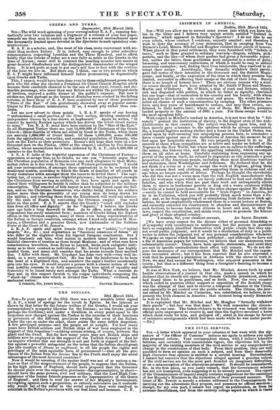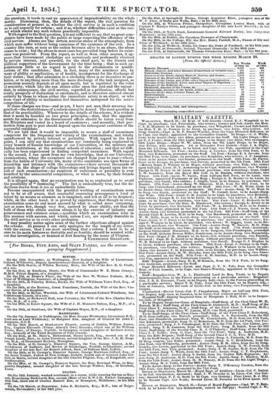THE CIVIL SERVICE.
Sin—A letter which appeared in your columns of last week with the Rig- nature of "An Officer of Customs" induces me again to address you upon this proposed reform. Your correspondent states, with I believe tolerable fairness, and certainly with considerable vigour, the objections felt by the majority of the existing members of the civil service to any comprehensive change in the constitution of that body. From their position, they are well qualified to form an opinion on such a subject, and from their deservedly high character that opinion is entitled to a careful hearing. Nevertheless, I cannot but conceive that the objections alleged against a genuine reform of the civil service are for the most part founded on imaginary difficulties, or on a misconception of the alterations proposed. It should be remembered, Sir, in the first place, as you justly remark, that the Government scheme has not yet transpired, even supposing it to be already matured. The report of the Commissioners of inquiry simply contains suggestions for the assistance of her Majeaty's Ministers in the formation of their promised measure. The letter of Mr. Jewett is merely a scheme addressed to the Commissioners. for carrying out the alterations they prepare, and possesses no official sanction ; though, for my own part, I cannot but regret its publication, as from its extreme fancifulness, and from the entirely college aspect in which it WAYS the question, it tends to east an appearance of impracticability on the whole matter. Dismissing, then, the 'details of the report, the real question for consideration at present is, whether the civil service is in such a condition as to call urgently for reform ; and if so, whether difficulties exist at the out- set which raider any such reform practically impossible.
With regard to the first question, it is not sufficient to say that no great com-
plaints have been made by the public at large respecting the efficiency of the civil service. Abuses are like certain noxious states of the atmosphere, from which men suffer without being conscious of the existence of the evil. In a country like 'ours, as soon as the nation becomes alive to an abuse, the abuse ceases to exist; but the abuse in most cases has prevailed long before its exist- ence was perceived. From the report, as well as from other sources, it up pears that Government clerkships are notoriously and professedly obtained by private interest, and awarded, for the chief part, to the friends and political supporters of the Government for the time being ; that in such ap- pointments little or no regard is paid to the attainments or qualifi- cations of the candidates; that, in fact, many of the nominees are, by want of ability or application, or of health, incompetent for the discharge of their duties; that after admission to a clerkship there is no incentive to am- bition, or to anything more than the mere discharge of the task assigned, as promotion scarcely depends at all upon merit, but is regulated by the rules of seniority, which like the sun shines alike upon the just and the unjust : that, in consequence, the civil service, regarded as a profession, affords but scanty prospects of distinction or emolument, and is therefore entered almost entirely by those to whom either the immediate salary is an object, or who from want of ability or inclination feel themselves indisposed for the active competition of life.
If these charges are true-and as yet, I have not seen their accuracy im- peached-the desirableness of a reform cannot be denied. The next question is that of its practicability. Whatever be the details of the scheme, it is evident that it must be founded on two great principles,--first, that the appoint- ments for admission to the Government offices should be taken away from the Ministers and vested in a board of examiners ; and secondly, that pro- motion from post to post should depend upon the subsequent exertions of the successful candidate.
We are told that it would be impossible to secure a staff of examiners
competent for the frequency and variety of the examinations, and totally uninfluenced by private interest or partiality. With regard to the first point, I can only say that examinations are constantly being conducted in every branch of human knowledge at our Universities, at the military and Indian institutions, at the national schools of education ; and that no diffi- culty has been experienced in finding competent examiners. With regard to the second, I can speak from my own knowledge, that at our University examinations, where the examiners are changed from year to year-where, from the habits of University life, many of the candidates are upon terms of friendship and intimacy with the examiners-where several thousands of pounds in the shape of college fellowships and livings depend upon the re- sult of each examination-no suspicion of unfairness or partiality is ever breathed by the unsuccessful competitors, or what is more, by their friends and relations.
It is alleged again, that no examination can be so conducted as to avoid the possibility of" cramming." The fact is undoubtedly true, but the de- ductions drawn from it are as undoubtedly false.
Persons unacquainted with the practical working of examinations seem not to be at all aware, that successful cramming presupposes a kind of talent by no means so common as is imagined, and not at all to be despised ; while, on the other hand, it is proved by experience, that though in every examination some do and must succeed by what is called mere cramming, just as some few, thongh very few, succeed by sheer ability, yet that the bulk of those who obtain success obtain it by the exercise of industry and perseverance and common sense,-qualities which an examination tests in this manner with success, and which, unless I err, are equally desirable in the civil service as in every other profession. I may possibly notice again some of the further objections alleged against the scheme. At present I can only apologize for the length of my letter, with the excuse, that I am most unwilling that a reform I hold to be at Onee in its main features so desirable and so feasible, should be scouted with- out due investigation, or damned at first hearing by the name of Utopian.
A CAMBRIDGE GRADUATE.



































 Previous page
Previous page